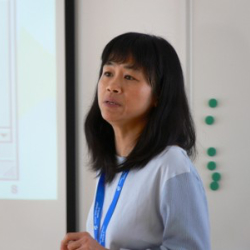
International Workshop on
Human-Engaged
Computing
November 10th, 2017

International Workshop on
Human-Engaged
Computing
The Center for Human-Engaged Computing (CHEC) has organized an international workshop on Human-Engaged Computing (IWHEC 2017). The worship will be held at Kochi University of Technology in Japan on November 10th, 2017.
The aim of this workshop is to rethink the relationship between humans and computers with particular attention being paid to our future as human beings. Seven distinguished speakers from around the world and from several domains will give their different views on HEC and related topics. Consistent with HEC’s holistic approach, our speakers represent not only Human-Computer Interaction but also the humanities, engineering design, computer sciences and cognitive science.

Abstract: In this talk I will theorize about a Socio-Technical approach to HCI design for engagement that presents human engagement as both process and outcome of design. The Socio-Technical tradition indicates that looking at engagement only or mainly from a technical design side is the wrong way to go; instead the social and the technical need to be considered on an equal footing. Based on this, I theorize a so-called Human Work Interaction Design framework for the design of work engagement within a digital work environment. I present the framework, illustrate it by revisiting a case study, and compare it with other HCI approaches to human engagement. In conclusion, this talk offers a Socio-Technical conceptualization of human-engaged computing. The aim is to contribute to our overall understanding of HCI.

Abstract: Value sensitive design is a theoretically grounded approach to the design of technology that accounts for human values in a principled and systematic manner throughout the design process. It has been under active development and use since the 1990s, led by Professor Batya Friedman at the University of Washington, along with a wide range of other researchers. In this talk, I will first describe the value sensitive design theory and methodology, then present a set of illustrative applications of value sensitive design, followed by a discussion of some open problems and critiques. I'll conclude with some ideas on applying value sensitive design to the theme of the workshop -- rethinking the relationship between humans and computers -- and invite other workshop participants to help explore this topic.

Abstract: Gamification has become a buzzword in recent years. Everything seems gamifiable, including, of course, learning. In fact, game-based learning (GBL) has already existed for decades, and digital educational games (DEGs) have increasingly been utilized since the turn of the millennium. The underlying assumption is that the motivational power of game elements can engage humans in learning activities and thus improve learning outcomes. However, this assumption has been challenged in ongoing debates, given inconclusive empirical findings on the effectiveness of DEGs and varied epistemological stances. Specifically, the notion of engagement remains contentious, especially its measurability. In this talk, I will first present a brief history of gamification and three cases of DEGs involving different target groups (pre-schoolers, school children, university students) and domains (computer science, law, cultural heritage). I will then reflect on the conceptual, methodological and practical arguments whether gamification may (dis)engage humans in technology-enhanced learning activities in general and DEGs in particular.

Abstract: In this talk, I address the big crisis of our time – climate change and the mass extinction
event we are living through – by making three suggestions:
1) We are still learning what we are as a species and what we are capable
of.
2) We have the means to meet in new relations with ensuing opportunities for
cultural change and growth.
3) Our digital technologies have need to follow these lines of enquiry for
all our sakes.
My title, Framing Wonder, refers to the conclusion I draw, that whether we save or lose the
finer points of living, designing so that we give our attention to them can only benefit us.

Abstract: For several decades, researchers have observed and interviewed designers and conducted experiments with designers vs. non-designers—all contributing to a synthesis, sometimes referred to as design theory or “design thinking.” Design thinking, in this view, is what successful designers have mastered, what student designers must learn, and what sets designers apart from (in many of the studies) engineers. Yet as someone trained in the humanities, I cannot overlook the similarities between the ways that these discourses articulate certain key design concepts and practices and my own experiences studying literature and the philosophy of art. In both, human-made objects are understood as coherent compositions that in some sense to embody/communicate concepts, histories, values, and knowledge, which can be accessed by competent readers/interpreters. In this talk, I propose that, instead of reifying “design thinking” as its own unique phenomenon, there might be some benefit towards exploring its contiguities with related practices. In doing so, we might cross-pollinate concepts and practices, thereby enriching both. In this talk, I will try out this proposal by explicating the purposes and mechanics of interpretation as a literary practice side-by-side with the mechanics of design problem framing—not to argue that they are identical, but to probe their relations and identify openings for mutual benefit.

Abstract: One design challenge is how to address the reality of global cultural diversity, such as the tension between cultural diversity and cultural sensitivity. This talk introduces a practice-oriented critical methodology for global design with case studies, a book project on social media design I’m completing. Built on my earlier work in cross-cultural design, this approach employs a practice vision to tackle cultural differences in the global design process—the differences in various identity categories such as ethnicity, age, class, religion, gender, sexuality, and ability as manifestations of cultural diversity. It applies a macroscopic understanding of culture and structure to drive microscopic design implementations. Informing new ways to reassemble the cultural, it inspires for designly problem-solving in this increasingly globalized world divided by cultural differences.

Abstract: The paper examines a computational design approach for improving user interface designs taking into account individual abilities. In ability-based optimization, designs are created by an optimizer and evaluated against model of an individual performing tasks. In our approach, individual abilities are parametrically expressed as part of a task-specific cognitive model, and the model estimates how the individual might adapt her interaction to the task. Optimized designs can potentially improve speed and reduce errors in interaction. Ability-based optimization does not necessitate extensive data-collection and could be applied both automatically and manually by users, designers, or caretakers.
| Time | Duration | Schedule |
|---|---|---|
| 08:00 - 09:00 | 1 hour | Registration |
| 09:00 - 09:10 | 10 minutes | Welcome Speech - Prof. Masahiko Isobe, President of KUT |
| 09:10 - 09:20 | 10 minutes | Opening Remarks by conference chairs |
| 09:20 - 10:05 | 45 minutes | Torkil Clemmensen: Theorizing about a Sociotechnical Approach to Human-Engaged Computing |
| 10:05 - 10:50 | 45 minutes | Alan Borning: Applying Value Sensitive Design to Rethinking the Relationship between Humans and Computers |
| 10:50 - 11:00 | 10mins | coffee break |
| 11:00 - 11:45 | 45 minutes | Effie Law: Does Gamification (Dis)engage Humans in Technology-Enhanced Learning Activities? |
| 11:45 - 12:30 | 45 minutes | Ann Light: Framing Wonder: Digital Ways of Being at a Time of Rapid Change |
| 12:30 - 14:30 | 2 hours | Lunch, CHEC Technical Tour, and Poster Presentations |
| 14:30 - 15:15 | 45 minutes | Jeffrey Bardzell: After Design Thinking |
| 15:15 - 16:00 | 45 minutes | Huatong Sun: Upholding Global Cultural Diversity with a Practice-Oriented Critical Design Approach |
| 16:00 - 16:10 | 10 mins | coffee break |
| 16:10 - 16:55 | 45 minutes | Antti Oulasvirta: Ability-Based Optimization |
| 17:00 - 18:00 | 1 hour | Free Discussion & Closing Remarks |
| 19:00 - 21:00 | 2 hours | Reception |

The concept of Human-Engaged Computing has been published in the IEEE Computer Journal, Vol.49, No.8, entitled “Rethinking the Relationship Between Humans and Computers”. This theme was also presented in a panel discussion entitled “Human Computer Integration Versus Powerful Tools” at ACM CHI 2017 (Proceedings of the CHI Conference Extended Abstracts on Human Factors in Computing Systems (CHI'17), pp.1277-1282, Denver, USA).
See IEEE Computer Article
See CHI'17 Panel
Kochi is connected by air and rail services from major cities in Japan, e.g., Tokyo and Osaka. The flight from Tokyo’s Haneda Airport to Kochi’s Ryoma Airport takes about 1 hour while the flight from Osaka’s Itami Airport takes about 40 minutes.

If you need visa help, please complete this form.
P.S. If you have difficulties to access Google Docs, please fill this form and send to i@wangchen0413.cn
If you need assistance booking accommodation please contact:
Yu Nagata <nagata.yu@kochi-tech.ac.jp>.